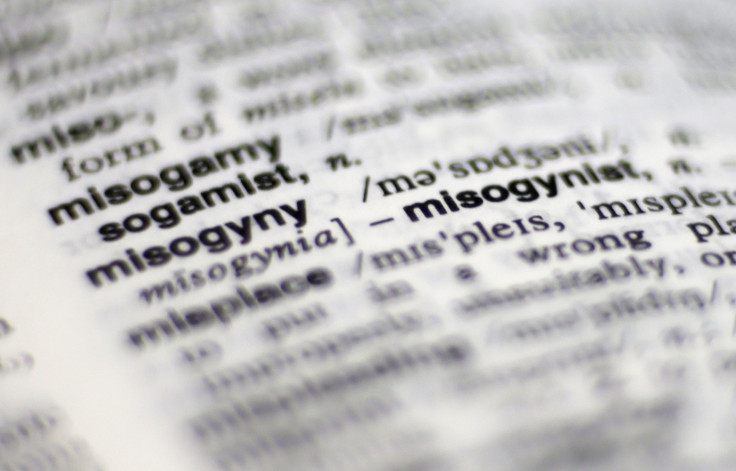A Search For Meaning: Why We Obsessed With The Word 'Culture' In 2014

Why, out of all the words people could be looking up in the dictionary, is a fusty term like "culture"-- Merriam-Webster's word of the year -- gaining sudden currency? In a statement about the choice, the dictionary's editors argued that the word "moved beyond its academic or classroom usage to the conversation at large, appearing in headlines and analyses across a wide swath of topics," in phrases such as "rape culture," "consumer culture" and "the culture of transparency."
The word of the year is chosen based on the number of online searches for a particular word in combination with how much those searches increased from the previous year. Last year's word was "science."
Search for meaning
"'Culture' in the metaphorical sense in which we normally use it," said Robin Lakoff, professor emerita in the linguistics department at UC Berkeley, "is about five centuries old in English. It is a pretty close equivalent of 'society' as in 'Our culture/society believes in democracy.' Its use, then, very often functions not (as Merriam-Webster would have it) to define ideas but rather to try to determine who we (this culture/society or someone else's) is or is not right now; what creates our cohesion or 'us-ness.' "
This cohesion, Lakoff argues, or at least its illusion, might be falling apart, which results in the search, literally, for meaning. "A lot has been happening recently to force us to acknowledge," she said, "that maybe we are more diverse than we can handle: the immigration crisis, Ferguson, etc. To talk about how the 'culture' believes and acts is to enable us, falsely, to conclude that we really are one people, one society."
In phrases like "culture of violence" and "rape culture," Lakoff said, it could be that "[W]hen we use them, we are excusing ourselves for permitting what they describe: 'Well, yeah, that's a bad way to be, but everyone does it (the culture), so we can't change it'; and 'Yes, we -- or you -- are a pretty terrible bunch. What should we do about it?' "
Cultures, everywhere
For Alexis Cornelia Wellwood, assistant professor of linguistics at Northwestern, Merriam-Webster's dictionary definition of "society" and "culture" may look interchangeable, but the decline in the use of "society" in favor of "culture," she said, is what linguists call "semantic shift, where one one word takes on the primary responsibility for a particular sense or connotation that used to belong to or be shared with a different one."
"To my ear," said Wellwood, "'society' can be used to refer to the socio-political fabric that binds a group of people together, typically within some particular geographical region. And you're either part of a given society or you're not. But 'culture' can be used to pick out a group on the basis of nearly anything: manner of dressing ("Harajuku culture"), the Internet sites they frequent ("Reddit culture"), what sort of work they do ("programming culture"), and so on. Members of a culture in this sense needn't be in the same geographical region, and they can belong to more than one group."
Wellwood was intrigued that Merriam-Webster speculates on what the lookup stats tell us about the "conversation at large," but she said that they reveal the limitations of the dictionary.
"We often think of dictionaries as the experts on what words mean," said Wellwood, "yet the phenomenon of semantic shift shows us that, paradoxically enough, it's the users of the language that are the ultimate arbiters. Speakers constantly renegotiate word meaning, or invent new words when the old ones won't adapt. The job of the dictionary is actually just to try and keep up."
"We're simply using the word culture more frequently," Peter Sokolowski, editor at large for Merriam-Webster, told Mashable. He also suggested that the dictionary can almost function as a semantic mirror.
"[T]he reasons words are looked up aren't just about not knowing what they mean," he said. "Sometimes we seek inspiration or a way to check in on ourselves. Of an estimated 100 million lookups on the website each year and a similar number on the company's app, culture enjoyed a 15 percent year-over-year increase."
'Culture' wars
When asked what she thought of this year's runners-up for word of the year -- nostalgia, insidious, feminism, and "je ne sais quoi" -- Lakoff said, "Intriguing! A poet would make something of it.”
So what does a poet -- Elisa Gabbert, whose book "The Self Unstable" the New Yorker recently raved about -- make of it?
"I suspect we often turn to the dictionary to double-check our assumptions about the denotation of a word based on the -- yes -- cultural connotations," Gabbert said. "'Feminism' is one of those words that almost no one knows the 'dictionary definition' of; people guess at what it means based on the way it's used (or misused) in the media or in conversation, which is usually derogatory and ridiculous. See Time's inclusion of 'feminism' on a list of words to ban. See also one of my favorite Onion headlines ever, from October of this year: 'I Don't Support Feminism If It Means Murdering All Men.' This is not too far off from actual usages in the wild."
As a result, she said, feminists often link to the definition, others look it up, perhaps "hoping to back up their beliefs and expecting a much different definition."
Gabbert added, "I think it's interesting that so many of the words on the list are indicative of the ongoing 'culture wars.' Is 'nostalgia' to blame for our stagnating human rights crusades? 'Insidious' nostalgia vs. the 'social justice warriors'?" "I can't explain 'je ne sais quoi' though," Gabbert said of the French phrase for the vague concept "a pleasant quality hard to describe."
"Maybe somebody said it on TV."
© Copyright IBTimes 2025. All rights reserved.






















